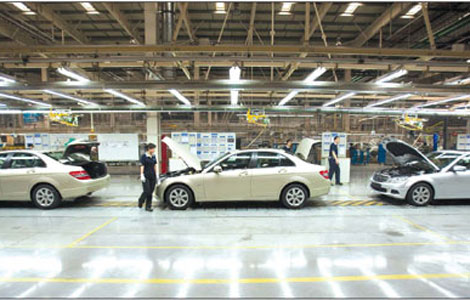Calm resilience key to Japanese rebirth
Updated: 2011-03-18 10:19
By Sun Lijian (China Daily European Weekly)
The massive earthquake that has left Japan reeling after March 11 not only placed an unprecedented roadblock to the Japanese society recovering from its financial crisis, but has also cast a shadow on the global economy, which is now facing inflation risks.
But will this strong market reaction last long? Will China's economy be dragged down? Will the global economy regress because the world's third largest economy is caught up in a crisis?
The biggest harm to the Japanese economy has been the effects from the nuclear crisis at the Fukushima Daiichi plant.
If severe nuclear pollution erupts, Japan will have to relocate its population and its industries, which would create panic in the country. With Japan's economy slumping, people in Japan will sell their national debt, causing sharp prices dip in the bond markets. The Japanese government would go bankrupt as a result of its inability to refinance the economy.
Of course, the International Monetary Fund and Group of 7 or G20 countries will lend a hand to Japan. If they don't, Japan's economic power will fall, posing a major threat to the economic development of other countries, including China.
Even if the nuclear crisis is under control, the negative impacts of the great earthquake will be severe. A large number of Japan's companies have stopped production because of a shortage in electricity and damage to their factories.
Japan needs more money to finance its recovery from the natural disaster. Traditionally, there are three ways for countries to finance a recovery from a natural disaster: cut spending, raise revenues or print money. Japan, because it has to, is taking the third option. Japan wants to get out of this mess by monetizing the deficit.
But although the catastrophe has killed many and created massive economic loss, the negative impact on the nation's manufacturing, exports and competitiveness do not compare to the negative impacts from the Osaka-Kobe earthquake of 1995.
In recent years Japan's northeast region has modernized its industries in rapid fashion with many brands setting up research and development bases around the Sendai region. But the region's economic performance pales in comparison to other regions in Japan. Japan's manufacturing and export regions are mainly located in the Keihin, Hanshin and Kyusyu regions, which were not affected by the earthquake.
Companies in the Hanshin region recovered half a year after the earthquake in 1995 and it took two years for the overall economy to fully recover. The economy performed better than most people predicted after the 1995 quake.
Since then, Japan has strengthened its ability to disperse its domestic economic risk. If the nuclear crisis can be contained, Japan's industries won't take long to recover.
In the long run, homeland reconstruction will open a door for many Japanese companies. Companies will find more business opportunities that weren't available before. Unemployment pressures on the government will be pacified. Ultimately, an uptick in employment and new profits gained by Japanese companies will help cut down on the country's fiscal deficits. But the amount of funds channeled into controlling the nuclear crisis and resulting pollution will deteriorate the debt-paying credibility of the Japanese government and the vitality of Japan's economy.
For China, Japan is an important exporter of semiconductor and auto parts. Japanese companies manufacture electronics, steel, plastic, organic compound and auto parts for Sino-Japanese trade. A shortage in those products will raise prices for high-end products such as the iPad 2 in China.
China is the largest export destination for Japan, while some emerging markets and countries in Europe and the United States are China's major export markets. Any absence of exports from Japan would affect these markets and China's final capacity of product supply will decrease.
Looking down the road, the impact of a shortage in Japanese products on China can be alleviated. But when Japan recovers from the disaster, the yen will depreciate due to capital outflow during the disaster. It will help increase Japan's exports to China. In fact, the Japan External Trade Organization expressed optimism in its Sino-Japan trade prospects report before the earthquake, saying that Japan's surplus will hit a record high.
Over the long haul, the negative economic impacts from Japan could be offset by the growth of potential enterprises in China as well as manufacturers in South Korea and Europe. Essentially, the global financial market will be heavily influenced by what happens after the Japanese earthquake.
As Japan's manufacturing base shrinks, it could temporarily bring down the prices of bulk commodities and could slow down the global economic recovery.
In the short term, the sharp fall in stock prices for insurance companies and the possible national bankruptcy would lead to panic in the market.
With that said, 2011 is no longer the era before 2008, when financial devices were abused worldwide. The dangers that derivatives created for insurance markets will definitely not spread to all financial industries.
In addition, if Japan holds its low interest rate policy in the long term (if the Japanese economy continues to deteriorate due to the earthquake) and its fiscal deficit continues to climb, the increasing depreciation and excessive liquidity of the Japanese yen would cause inflation, asset bubbles and impose pressures on currency appreciations in other countries, especially developing economies such as China, which has a higher interest rate and is facing pressures to appreciate its currency.
But Japan should not be so somber: The economy has been on firm footing and the Japanese national character is resilient. It is in adversity that a country shows its mettle. Japan was noticeably calm during the earthquake's aftermath, showing resilience and fortitude. Those national characteristics can be taken as Japan's soft power, which is even stronger than Japan's hard power, which is the nation's strong economic power created by the country's strong industrial leadership.
That strong soft power will prevent the country from descending into chaos following a great disaster. Its leaders must match the mettle of its people. If they are able to do so, a rebirth is inevitable.
The author is a scholar with Fudan University.
E-paper

Factory fever
Despite auto manufacturing bubble scare, car giants gear up expansion of factories.
Preview of the coming issue
Dressed for success
Fabric of change
Specials

Earthquake Hits Japan
A massive 8.8 magnitude quake hit the northeast coast of Japan on March 11,2011.

NPC & CPPCC sessions
Lawmakers and political advisers gather in Beijing to discuss major issues.

Slide: Japan quake
Devastating earthquake and tsunami left millions without water, electricity, homes or heat.
